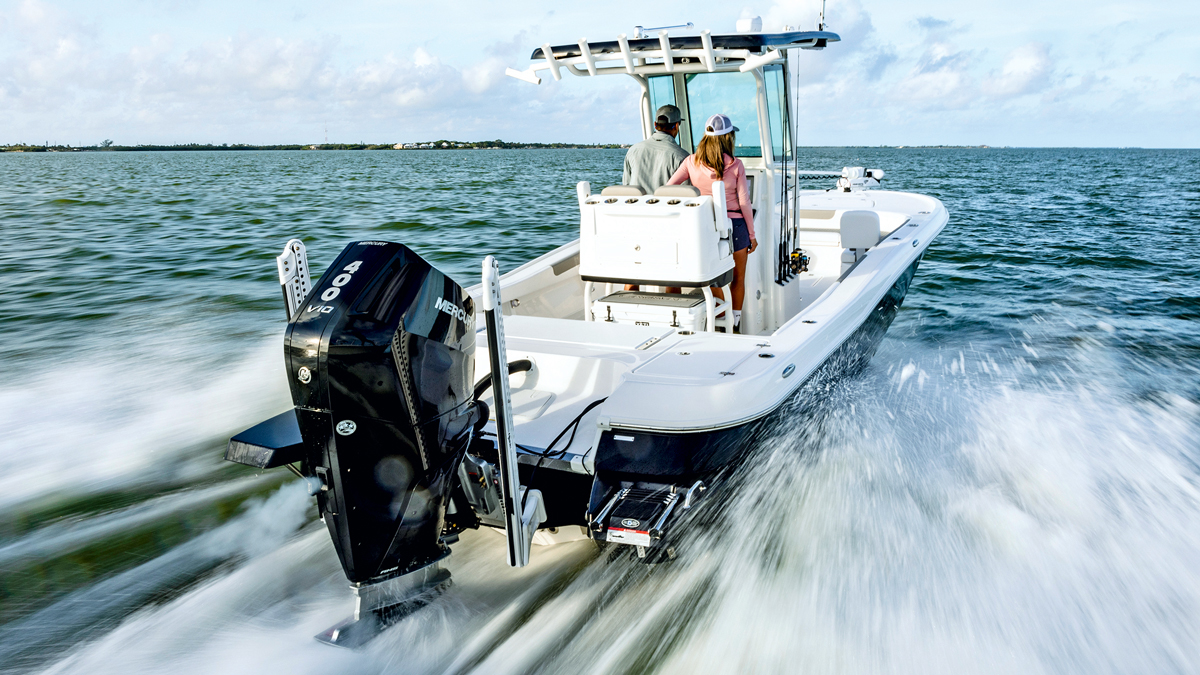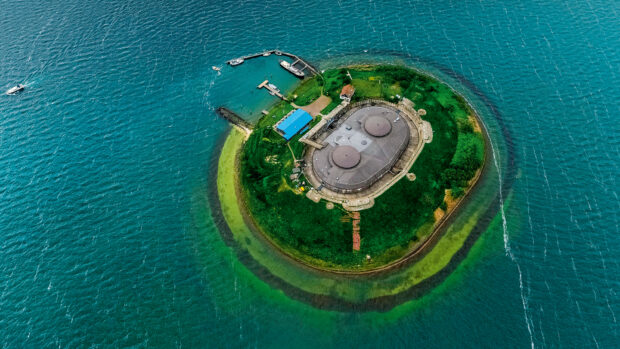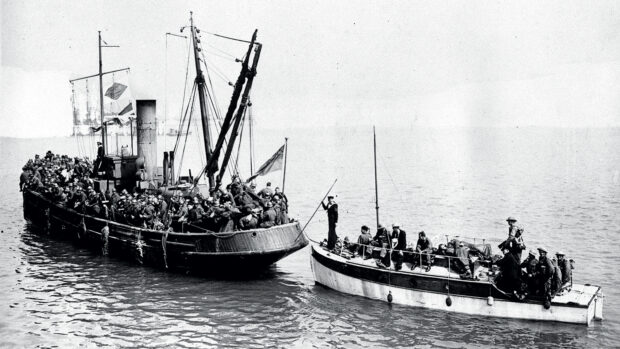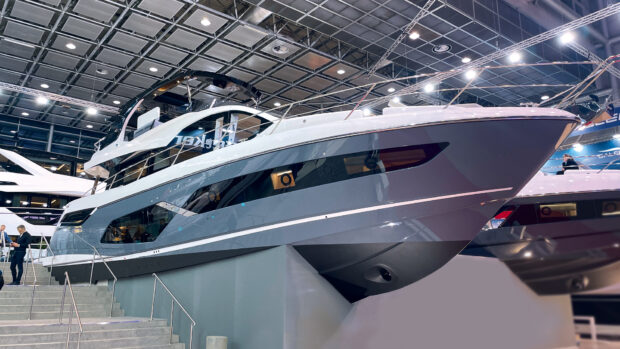Mercury’s new 400hp Verado is the world’s first V10 outboard engine. Hugo Andreae takes a closer look…
Every time we think outboard engine design has reached its peak, someone finds a way to top it. First it was Yamaha’s monster 425hp V8, then Mercury trumped it with an outrageous 600hp 7.6-litre V12. Now it seems to have done it again with a slightly less powerful but arguably more exotic 400hp V10 outboard.
We should have seen it coming; having already launched a 175-225hp V6, 250-300hp V8 and 500-600hp V12, it was only a matter of time before Mercury plugged the gap with new 350hp and 400hp engines. But predictable as the new power outputs were, we still hadn’t predicted the V10 configuration.
It’s not just that no one has ever dared build a V10 outboard before, it’s the fact that few engine manufacturers in any sphere bother with such a rarefied configuration – other than a handful of racing cars and a smattering of high-powered Audis, BMWs, and Lamborghinis, V10s are rarer than hens’ teeth.
So why has Mercury gone down the V10 outboard route and what makes it so special?
Modular magic
The simple answer is modularity and the economies of scale that come with that. In essence the V6, V8 and V10 Verado engines all share the same modular design that starts with a narrow 64-degree angle between the two banks of cylinders.
This helps keep the powerhead slimmer than the typical 90-degree bank angle found in most automotive applications, meaning even these big V10s can be spaced just 26in apart in multi-engine installations. It also allows them to share many of the same components.
The V10 outboard has exactly the same bore and stroke measurements as its V6 and V8 siblings (92mm x 86mm) meaning they can all be built on the same production line and fitted with the same pistons.
If this sounds like a money-saving exercise, it also confers real benefits on the end user. The oversquare cylinder dimensions and large 5.7-litre capacity are said to deliver class-leading torque for exceptional hole-shot acceleration.
Article continues below…

Most powerful outboard? Mercury’s 600hp V12 monster

Which V8 outboard? Mercury Verado and Yamaha XTO go head-to-head
As ever Mercury won’t give a precise torque figure but that big block displacement and impressive power-to-weight ratio (400hp:316kg) certainly bode well, while a wide rev range that extends up to 6,400rpm should suit everything from pilothouse craft to performance RIBs.
Arguably even more important than outright power is the new V10 outboard’s refinement and fuel efficiency. Until now the gap between the naturally aspirated 300hp V8 and 600hp V12 has been filled by a pair of the previous generation L6 2.6-litre straight six engines boosted to 350hp and 400hp by mechanically driven superchargers.
Effective as this was, it came at the expense of both additional mechanical noise and fuel consumption. The new V10 outboard, by contrast, is a naturally aspirated quad-cam engine that needs no extra help to deliver its power.

Naturally aspirated V10 is more fuel efficient than the current supercharged 400hp L6 engine
Mercury says the new V10 is up to 56% quieter than its rivals at wide open throttle, although an advanced sound control option still allows owners to dial up the sound for a throatier start-up and idle when they want neighbouring boats to take notice!
V10 outboard: Power and control
An all-new gearbox and large-diameter Revolution-X propeller with wider blades than normal are said to take full advantage of the new engine’s torque characteristics to maximise low speed steering control, acceleration and fuel efficiency, as well as long-term reliability.
It’s also compatible with Mercury’s new electric power steering system for multi-outboard installations, offering enhanced responsiveness and simplified rigging as well as joystick control.

New electric power steering system links to joystick control
The other big win is a new high output 150-amp alternator to feed power-hungry devices such as air-conditioning and gyro stabilisers as well as rapid charging for the house and starter batteries.
This can be upgraded to an optional 48V/12V alternator that pairs with Navico’s new lithium-ion Fathom e-Power system to eliminate the need for a separate on-board generator.
Speaking at the launch, Mercury’s vice president of product development and engineering, Tim Reid, said: “We challenged our engineers to improve acceleration and overall performance with the new V10 Verado outboards, while also making them quieter and lighter than competitors’ outboards in this horsepower range.
“Once again they exceeded expectations while also incorporating technologies that make boat operation and maintenance intuitively simple.”

Narrow angle V10 keeps the width down for twin or triple installations
V10 outboard servicing
Minor and major servicing intervals of 100 and 300 hours are the same as the current L6 engines while both the 350hp and 400hp V10 outboards are available in multiple shaft lengths.
Pricing for the UK has yet to be announced but expect deliveries to start some time this summer. In the meantime production of the L6 SC engines will continue until the new V10 outboards come on stream.
Mercury V10 outboard specifications
Power: 350hp & 400hp
Max rpm: 5800rpm – 6400rpm
Capacity: 5.7 litres
Cylinders: 10
Bore x stroke: 92mm x 86mm
Weight: 316kg
Alternator: 12V/150A, 48V/150A
Gear ratio: 2.08:1
Fuel: 87-octane unleaded
Shaft lengths: 20in, 25in, 30in, 35in
Servicing: Annually or every 100 hours
If you enjoyed this…
Be first to all the latest boats, gadgets, cruising ideas, buying advice and readers’ adventures with a subscription to Motor Boat & Yachting. Available in both print and digital formats, our monthly magazine will be sent directly to your home or device at a substantial discount to the usual cover price. See our latest offers and save at least 30% off the cover price.

New hydrodynamic gearbox minimises drag











